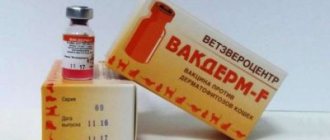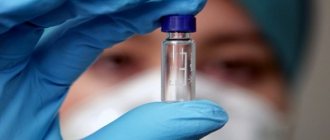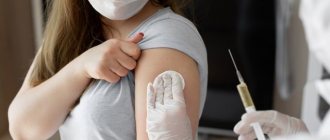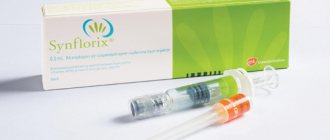Vaccination is practically the only reliable way to protect against infection. A healthy lifestyle and balanced nutrition, of course, should have a place in a person’s life, since they ensure the normal functioning of the entire body. But, unfortunately, these factors cannot guarantee protection against infections.
Vaccination is the formation of an adequate response of the body to infection through a natural pathway. The essence of vaccination comes down to the introduction of weakened or killed microbes so that the body “remembers” the enemy and, when the microbe enters again, is ready to launch protective reactions with a vengeance. Thanks to vaccinations, you can prepare the body to face such serious diseases as hepatitis, diphtheria, measles, whooping cough, polio, mumps, tetanus, tuberculosis and so on. Today, vaccination is a standard preventive procedure, which is a completely controlled process, the reaction to which is known to doctors and is quite predictable.
Each region, each country has its own “Vaccination Calendar”, which includes the so-called mandatory vaccinations. This set of vaccinations depends not only on how relevant certain infections are in a given territory, but also on the financial capabilities of the state.
The calendar represents a country's government's financially backed commitment to its population. Therefore, the Calendar is the minimum set of vaccinations that are considered mandatory, and responsible parents must ensure that their child receives them.
Every citizen of our country has the right to free protection against infections.
It should be noted that regulations, for example, the order on the National Vaccination Calendar, state that vaccination can be carried out with all vaccines that are registered on the territory of the Russian Federation. Thus, the patient has the right to choose: get vaccinated free of charge at his place of residence or choose vaccination in a commercial center.
Often, the Vaccination Calendar prescribes three-time vaccination (for example, against hepatitis B, DPT, etc.), and with this set the child goes into adulthood, in which repeated vaccinations are no longer required.
Unfortunately, it cannot be said that a person who is vaccinated is 10094 protected from infection, but he is 10094 protected from serious complications and death. Even if he gets sick, the disease will be mild.
Do I need to prepare my child in any way before vaccination?
Most children do not require any special preparation. Before vaccination, the doctor examines the child, measures his temperature and questions the mother in detail about any complaints about his health. Based on the information collected, the doctor decides which vaccine needs to be administered at the moment and whether the child has contraindications for vaccination.
Parents should not take on the functions of a doctor, since knowledge gleaned from the Internet is clearly not enough to independently determine the effectiveness of a particular vaccination, much less decide whether a child needs it or not. Unfortunately, pediatricians do not always have the time, and sometimes even sufficient qualifications, to clearly explain to parents why vaccination is necessary. Parents, without reliable information, refuse to vaccinate their children. But in doing so, they expose them to enormous risk, since if any infection, such as polio, measles or whooping cough, is introduced, unvaccinated children will be the first to suffer.
Should I give my child an antihistamine before vaccination?
I would like to draw special attention of parents to the inadmissibility of self-use of antihistamines before vaccination. Antihistamines and antipyretics reduce the effectiveness of vaccination. Therefore, if the child does not suffer from a severe chronic disease and has no indications for the use of these drugs, they should not be given to the child “just because” or “just in case.”
If any reaction occurs (fever, local reaction, or, for example, stool thinning, which occurs in response to the administration of the polio vaccine), the doctor will in fact prescribe the necessary drug, which will be most effective in each specific case.
T cell mediated immunity - an example of RSV infection
Is T-cell immunity necessary?
Children lacking T-cell immunity are extremely susceptible to advanced RSV infections. Patients with severe combined immunodeficiency (SCID) are unable to clear the virus. Also, in a mouse model, animals without T cells became chronic carriers of the virus. Selective depletion experiments show that CD4+ and CD8+ T cells can each partially compensate for each other, with CD8+ T cells clearly being more important. Despite the persistence of the virus, strikingly, only mild disease occurs—in patients with SCID, it is often the newly initiated T-cell reconstitution after bone marrow transplantation that results in severe clinical disease. T-cell-mediated elimination of the virus is accompanied by T-cell-induced immune pathology (Fig. 6). In general, T-cell immunity is thus required to control primary infection—antibody-mediated immunity is probably most often sufficient to control secondary infection.
Is T-cell immunity sufficient?
To answer this question, there is only data obtained from animal experiments. In a mouse model, B cell-deficient mice are completely protected from reinfection. In addition, transfusion of RSV-specific memory T cells into naïve animal recipients may interrupt RSV replication. RSV-specific T cells can, at least in animal models, also provide antiviral protection in the presence of B cells. Also in these experiments, the dual role of T cells in RSV infection became clear: immunopathologically mediated disease is the price of controlling the virus through the transfer of specific CD8+ T cells. In the mouse model, both processes are mediated by the same effector molecules interferon-—this also makes it difficult to control the pathogenic effects of T cells at the molecular level without impairing viral clearance.
Is it possible to induce T-cell immunity even in the presence of antibodies?
This is also why there is only a limited amount of data obtained from an experimental model. They indicate that, unlike B cell memory, RSV-specific T cell memory can be induced even when vaccination is carried out in the presence of transfused RSV-specific antibodies. Whether this T-cell immunity is sufficient to provide long-term protection against RSV disease is also unknown, nor is it known whether this knowledge can be transferred to humans.
In general, it is clear that T cells can make a significant contribution to antiviral immunity. An important goal remains to induce not only antibodies but solid memory T cells through vaccination. Since control of the virus can be carried out by T cells with the manifestation of immunopathology, it is very important to create a balanced B- and T-cell immunity (Table 1). Unfortunately, there are currently no reliable measurement methods that would allow the quantification of protective virus-specific T-cell responses. Antibodies should therefore continue to primarily serve as surrogate markers for the induction of antiviral immunity by vaccination.
What actions should parents take after vaccination? Are there any restrictions?
I repeat, vaccination is a completely standard procedure, so you should not put your child to bed and be “overprotective” of him. The family can live their normal lives, but, of course, remember that the child was vaccinated, and maybe be a little more attentive to the child.
When administering DPT and other serious vaccines in the next three days, try to adhere to a more or less gentle regimen for the child, that is, it is advisable to avoid unnecessary visits, limit contacts and the overall burden on the child. At this time, the baby is shown a calm home regime. Walking is not prohibited. Just try to cover the grafting site with clothing to prevent dirt from getting on it. And, of course, the walk should be of a reasonable length.
It is also recommended not to experiment with nutrition, that is, not to introduce new foods into the child’s diet, in the period a week before vaccination and a week after. If a child is prone to allergic reactions, during this period he should receive food that excludes those foods that can cause allergies.
If your child has had an injection (and almost all vaccines are injectable), try not to bathe him or her for a day after the shot. The next day, you can take a bath as usual, again, if the child does not have a temperature reaction.
After vaccination against polio, which is dripped into the mouth, it is recommended to limit food and drink for an hour, since the live polio vaccine can be washed off from the mucous membranes and not give the expected effect. This restriction does not apply to other vaccines that are administered by injection.
Thus, as you can see, the recommendations are the simplest. Strict restrictions are introduced in special cases related to vaccination of groups of children with severe chronic diseases, severe allergies, and so on.
The sanitary rules establish a recommendation regarding the post-vaccination period, according to which, after vaccination, a child should stay in a medical facility for 20-30 minutes. It is during this time period that the first manifestation of a possible allergic reaction is most likely. However, such situations in children, fortunately, are extremely rare. Parents who are concerned about the child's condition after vaccination can always stay and spend this time under the supervision of a doctor in a medical facility. If a child is prone to an allergic reaction, this condition must be met.
And one last thing. Before going for vaccination, it is advisable to have an antipyretic drug at home in case the child develops a fever in the evening. For babies under 1 year of age, it is better to take suppositories; for older children, a tablet preparation or in the form of syrup is suitable. The threshold at which it is necessary to reduce the temperature is different for each child. Parents can determine for themselves based on the child’s condition whether he needs to be given an antipyretic,
Vaccination – protection against infections
Before the invention of vaccinations, infections and viruses were the main cause of high mortality among the world's population and short life expectancy. But for more than 200 years in the world there has been an effective way to protect humans and animals from a number of infectious and some viral diseases. The first vaccination against smallpox was made by the English doctor E. Jenner at the beginning of the 19th century. Since then, vaccination (immunization) has become the most effective way for humans to prevent dangerous diseases.
Having been born, any baby not only finds himself surrounded by his mother’s affectionate hands, but is also forced to get acquainted with billions of microorganisms. From the first day of life, the immune system begins to work actively in the human body. The task of the immune system is to recognize and resist dangerous microbes. Since the cells of the immune system are formed in the mother's womb, every newborn baby is initially equipped with protection against many harmful bacteria.
Successfully repulsed attacks of microorganisms on the immune system go unnoticed; those bacteria that were able to get inside our body meet a formidable rebuff from the body’s defenses. A real battle begins, the outcome of which cannot always be predicted. If the body turns out to be stronger than the virus or infection, the disease will recede, and information about the type of bacteria will appear in the database of the immune system and the technology for suppressing a specific type of microbe will be recorded. When encountering the disease again, the body will know exactly how to act in order to destroy the “uninvited guests.” This type of immunity is called acquired or specific.
An unpleasant side effect of the first meeting and the battle of the immune system with pathogenic microbes can be complications. Sometimes “wounds” inflicted by a hostile environment do not heal completely throughout life and require constant therapy.
The system of disease prevention through vaccination is based on the phenomenon of so-called immunological memory. The human body is able to remember its reaction to a bacterium or virus and act according to this pattern in the event of repeated introduction of the antigen. Having learned about this, doctors were able to develop a scheme for the artificial formation of immunity.
During vaccination, a drug containing biomaterial of killed or weakened pathogens or a synthesized protein of a given type of microorganism is injected into the human body. The task is to launch a reaction to form specific immunity.
On days 5–7 after the vaccine is administered, immunoglobulins (specific antibodies) are produced in the body, identifying and destroying harmful microbes. The number of antibodies grows rapidly and reaches its maximum amount approximately 20–22 days after vaccination. Then the immunoglobulins disappear completely or almost completely, but B and T lymphocytes remain. These are immunological memory cells that carry information about the disease and methods of combating it. Subsequent attacks of the body by microbes of this type will be repulsed faster and easier: immunoglobulins will begin to be produced already on the first or second day, there will be many times more of them than during initial contact with carriers of the disease
Acquired immunity is formed after a one-time vaccination or requires repeated vaccination after some time. Once formed, acquired immunity helps either to repel the pathogen completely, or to cope with the danger that has entered the body easily and without complications.
Vaccination is a training test for the body in order to increase the strength of the protective barrier (immunity). Vaccination stimulates the body in a similar way to the action of the infectious agent itself, but can give more effective results in the fight against the disease. Just like a disease, a vaccine triggers the immune system's natural response to a pathogen, but does so on a controlled scale. The main advantage of immunization through vaccination is that vaccinations prevent the development of complications from diseases. It is known that the natural process of transmitting infectious diseases can lead to a malfunction in the normal functioning of some organs: kidneys, heart, liver, muscular and nervous systems, brain activity, and musculoskeletal system. Vaccinations help localize the action of microbes and ensure minimal losses in the fight for health.
Today, mass vaccination is a factor in economic growth on a global scale. Vaccination programs around the world save 6 million lives every year—children's lives. 750 thousand children do not become disabled. Vaccination gives humanity 400 million extra years of life every year. And every 10 years of life saved provides 1% of economic growth. Vaccination is recognized as the most effective medical intervention invented by man. Comparable results were achieved only by using clean drinking water.
Without vaccinations, modern parents would have to be prepared for the following:
- if infected with tuberculosis, in 38% of cases the child will die;
- when infected with diphtheria, death will occur in 20% of cases in adults, and in 10% of cases in children;
- the probability of death in case of infection with tetanus is 17-25% (with modern methods of treatment), and among newborns the mortality rate reaches 95%;
- in case of whooping cough, in one out of ten cases the child will suffer complications in the form of pneumonia, in twenty cases out of a thousand - convulsions, in four cases out of a thousand - brain damage (encephalopathy);
- The chance of getting complications from measles is 30%. These are blindness, encephalitis, diarrhea, severe respiratory tract infections. In one case out of a thousand, a child suffers a complication in the form of encephalitis;
- in Russia, in 16.9 per 100,000 cases, a child aged 0-5 years can develop Hib meningitis (hemophilus infection), and the mortality rate for this disease is 15-20%;
- the most dangerous complication of rubella disease - rubella (like measles) encephalitis (inflammation of the brain) - occurs in one in five thousand cases;
- in 90% of cases of rubella infection during pregnancy, the virus will be transmitted to the unborn child, and he will receive congenital rubella syndrome for the rest of his life;
- in 15% of cases with rubella during pregnancy, there is a risk of miscarriage and stillbirth;
- the risk of becoming infected with hepatitis B throughout life for each of us is 20-60%;
- the probability of complete recovery from chronic hepatitis B is very low - about 10%;
- chronic hepatitis B develops in 80-90% of children infected during the first year of life, and in 30-50% of children infected before the age of six;
- One in 200 cases of polio infection results in permanent paralysis (usually of the legs). 5-10% of such paralyzed people die due to the onset of paralysis of the respiratory muscles;
- In 20-30% of teenage boys and adult men with mumps, the testicles become inflamed (orchitis); in girls and women, in 5% of cases, the mumps virus affects the ovaries (oophoritis). in 50% of cases, both male and female infertility is caused by mumps suffered in childhood;
- in 4% of cases of mumps, the child will develop a complication in the form of pancreatitis;
- The mumps virus can cause inflammation of the membranes of the brain (meningitis) in 1 out of 200-5000 patients; very rarely, brain tissue is involved in the process, and then mumps encephalitis develops (inflammation of the membranes and substance of the brain);
- acquired sensorineural deafness caused by mumps is one of the main causes of deafness in childhood, which occurs in 5 per 100,000 patients with mumps;
- complications of chickenpox occur with a frequency of 5-6% and serve as a reason for hospitalization. 30% of complications are neurological diseases, 20% are pneumonia and bronchitis, 45% are local complications accompanied by the formation of scars on the skin;
- mortality from chickenpox is 1 in 60,000 cases;
- in 10-20% of those who have recovered from the disease, the varicella zoster virus remains in the nerve ganglia for life and subsequently causes another disease that can manifest itself at an older age - herpes zoster or herpes;
- About 8 per 100 thousand children under 5 years of age who are infected with pneumococcus will develop a complication in the form of pneumococcal meningitis. About 83% of cases of pneumococcal meningitis occur in children under 2 years of age;
- Between 8.7% and 52% of cases of pneumonia due to pneumococcal infection occur in infants under 6 months of age.
The rates of prevention of illness or serious complications by vaccines are quite high - much greater than the protection from serious injury when driving a motorcycle or car under all safety regulations. A helmet can protect a motorcyclist from traumatic brain injury only half the time, and a car seat belt is only 67% effective in protecting passengers and the driver from serious injury. The protective functions of vaccines are significantly higher. Any of the vaccines presented in Russia provides protection against the corresponding disease and complications during the course of the disease by at least 80%.
The discovery of vaccination marked the beginning of a new era in the fight against disease. The composition of the grafting material includes killed or greatly weakened microorganisms or their components (parts). They serve as a kind of dummy that trains the immune system to give the correct response to infectious attacks. The substances that make up the vaccine (inoculation) are not capable of causing a full-fledged disease, but they can enable the immune system to remember the characteristic signs of microbes and, when encountering a real pathogen, quickly identify and destroy it.
The production of vaccines became widespread at the beginning of the twentieth century, after pharmacists learned to neutralize bacterial toxins. The process of weakening potential infectious agents is called attenuation. Today medicine has more than 100 types of vaccines against dozens of infections.
Based on their main characteristics, immunization preparations are divided into three main classes.
- Live vaccines. Protects against polio, measles, rubella, influenza, mumps, chickenpox, tuberculosis, and rotavirus infection. The basis of the drug is weakened microorganisms - pathogens. Their strength is not enough to cause significant illness in the patient, but it is enough to develop an adequate immune response.
- Inactivated vaccines. Vaccinations against influenza, typhoid fever, tick-borne encephalitis, rabies, hepatitis A, meningococcal infection, etc. Contain dead (killed) bacteria or their fragments.
- Anatoxins (toxoids). Specially treated bacterial toxins. Based on them, vaccination material is made against whooping cough, tetanus, and diphtheria.
In recent years, another type of vaccine has emerged—molecular. The material for them is recombinant proteins or their fragments, synthesized in laboratories using genetic engineering methods (recombinant vaccine against viral hepatitis B).
According to the World Health Organization (WHO), infectious diseases account for 25% of the total number of deaths on the planet each year. That is, infections still remain on the list of the main reasons that end a person’s life.
One of the factors contributing to the spread of infectious and viral diseases is migration of population flows and tourism. The movement of human masses around the planet affects the level of health of the nation, even in such highly developed countries as the USA, the UAE and the European Union.
The most reliable information on vaccinations can be found on the website https://www.yaprivit.ru There you can also ask questions and get answers from highly qualified specialists in the field of immunization in Russia.
Chief freelance epidemiologist
health department of the Lipetsk region,
Candidate of Medical Sciences,
Andrey Nikolaevich Filatov
What to do if a child has a reaction to a vaccine?
If a reaction occurs, parents should call the facility where they received the vaccine and tell them about it. Ideally, healthcare workers should call themselves within the first or second day and find out whether the child has a reaction to the vaccine. But if there is no call, the parents need to call themselves, since the doctor in any case should know how the child survived the vaccination.
Wherever a child is vaccinated (by law, each of us has the right to choose a medical institution where he will be vaccinated), he will in no case be deprived of free medical care. And if a child needs medical help, it is enough to call a pediatrician at your place of residence. However, before calling an ambulance or a pediatrician to your home, it is recommended to call and discuss the situation with the doctor who administered the vaccination. There are cases when a completely standard situation is seen by parents as threatening the life of the child. In this case, the doctor will reassure the parents and give the necessary recommendations.







